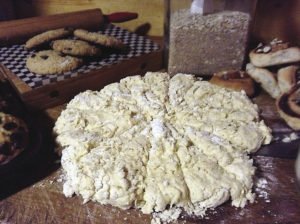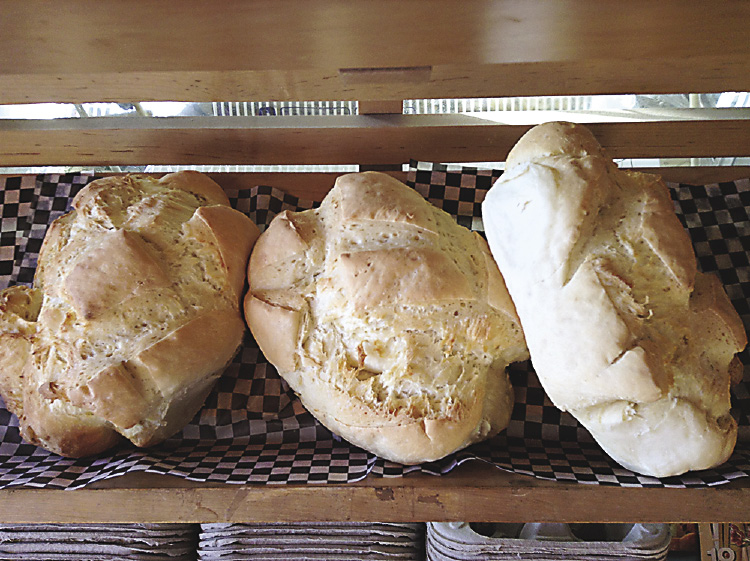When a neighbour gave me a container of ‘’sourdough starter’’ 25 years ago, I didn’t look after it very well, and after a few months, I threw it away. But recently when I heard about the 100-year-old sourdough starter at Metropolitan Moose Beanery & Cafe (The Moose) in Kakabeka Falls, I took notice of sourdough baking and its remarkable history. The original gooey dough can be kept alive for decades, passing from generation to generation in a family or community, keeping its own unique tangy taste without ever using store-bought commercial yeast.
Sourdough baking, which likely originated at least 3,500 years ago with the ancient Egyptians, starts with a mixture of flour and water that, left to ferment for days at room temperature, turns into a bubbling, sour-smelling dough of wild yeast (naturally-occurring airborne yeast) and lactic bacteria (like those found in yogurt). As long as the fermenting mass is ‘’fed’’ by replenishing the starter with flour and water, the dough is active (ready for baking), the culture stays alive and can potentially last indefinitely.
Julia Miles, co-owner of the Moose, said the sourdough starter, which they named Mark, has been living at the Moose for seven years. “Our sourdough was gifted to us by our good friend Mark – American Mark, as we like to call him – who was living in Minnesota at the time and now lives in Northern Ontario. Mark acquired this sourdough starter along with a tattered paper instruction stating that this bubbly, needy little container of goodness was more than 60 years old when [the note] was typed. American Mark then followed the instructions and kept this precious commodity alive for many years. It is not clear when the parent starter developed, but from all indications it is at least 80 years young and many say possibly over a century. “That would put Mark’s creation date between 1914 and 1934.”

Miles said that Mark’s roots are in the Grand Portage vicinity. “With the isolation of the area, it is no wonder that this was passed around from house to house and kept alive for so many years,” she said.
At the Metropolitan Moose, Mark has become a ‘’living creature at the cafe” with staff and family taking a vested interest in the “bubbly baby.’’ Today, Mark is stored in two 4-litre pails, and his home is on the kitchen counter.
“When we feel that Mark needs a break, one [of the containers] will go to the spa (fridge) for up to a week. Mark gets fed daily a diet of one cup flour, one cup milk and l/4 cup sugar. We started extra pails in the summer season and fed it only rye flour from which I make my favourite Sourdough Rye,” Miles said. Mark is added to just about anything that Miles bakes, from bread, muffins and scones to pancake batter.
Sourdough breadmaking is undergoing a renaissance worldwide with artisan bakers, leading to some unique ventures. In Stockholm, the world’s first sourdough hotel will ‘’feed’’ and look after sourdough starters for about $30 a week while their owners are away. At the Sourdough International online store sourdo.com, bakers can choose from 17 authentic sourdough cultures collected from ethnic bakeries around the world, dried, shipped with the flour they were grown and activated by feeding the dormant mixture. And there are sourdough cookbooks and plenty of helpful online sites to help one establish their own sourdough mixture.
Kakabeka’s Mark at age 80-100 years is in good company. For example, in San Francisco, the Boudin Bakery can trace their ‘’Mother starter” back 165 years to the 1849 California Gold Rush; in Juneau, Alaska, at the Gold Room Restaurant in the Westmark Baranof Hotel, they still use their original sourdough starter now more than 100 years old.
Lots of lore and legends tell of American and Canadian gold rush prospectors guarding their sourdough starters (“sponge”) like a stash of gold, keeping it warm by tucking them in their long johns or dangling sourdough earthenware pouches around their necks or belts. The dough-carrying prospectors who toughed it out for a winter in the Yukon or Alaska earned the nicknamed ‘sourdoughs’ and were immortalized in the classic best-seller “Songs of a Sourdough” by poet Robert Service. The world’s first copy of his book was sold to a bookseller in Northern Wilds area, in what is now Thunder Bay.
While munching on her sourdough bread, I mentioned to Miles that I might just try sourdough baking one more time. She said that next summer she might add jars of sourdough on the cafe’s menu. “And don’t fret about it—if I can keep it alive, you can,’’ she said, laughing.
Pumpkin Cranberry Sourdough Muffins from Julia Miles, Metropolitan Moose
4 cups flour (white or wheat)
2 cups sourdough starter
l l/2 cups sugar
2 teaspoons baking soda
2 tablespoons oil
2 eggs
1 cup pumpkin puree
1 cup milk
1 teaspoon vanilla
l/2 teaspoon sea salt
1 cup dried cranberries
Preheat oven to 350. Mix flour, sugar, soda and salt together, set aside. In another bowl, beat pumpkin, milk, starter, eggs, oil and sugar. Mix well, add vanilla. Mix the dry ingredients in very lightly – do not over mix. Add cranberries. You are now ready to fill your lightly greased tins and bake for approximately 20 minutes or until ready.
This story was originally published in the February 2014 issue of Northern Wilds Magazine.






